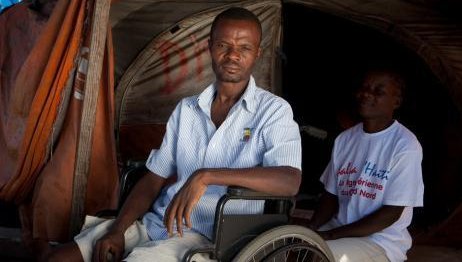JÉRÉMIE, Haiti (GPI)-- Juna Dol, 39, is unable to stand up straight. She can only push her body forward in a crablike walk through Jérémie, a small coastal town in southwestern Haiti. “I have been handicapped since birth, just like my brother,” Dol says. Dol and her brother were born with a genetic disorder, which doctors were unable to diagnose. “Despite my handicap, I became pregnant,” she says. “I was not ready for that pregnancy. It only increased my suffering.” She was living with her sister, but her pregnancy caused a conflict between them. “My sister refused to keep me at her house any longer and put me out into the street,” she says. Because of her disability, Dol was physically unable to deliver the baby, so she needed a cesarean section. The Haitian Health Foundation, a U.S.-based nonprofit organization located in Jérémie, paid for the procedure. “But what made matters worse was that after the baby was 4 months old, her father left me,” she says. “Now it was up to me to take care of her.” Dol says she is doing the best she can to raise her daughter, who is now 14 years old and in sixth grade. Haitian Health Foundation pays for her housing and contributes 500 Haitian gourdes ($12) a month to contribute to her livelihood. But she says that she doesn’t have enough capital to launch a business as a seamstress, the only trade she knows. People with disabilities living in Jérémie say they battle injustice daily and struggle to support themselves. Several have formed a local support group to defend their rights, but they say that it’s not enough. A government bureau provides some assistance from the capital, but there is no local delegation in Jérémie. Disabled citizens call for more vocational training so that they can get jobs to support themselves and their families. More than 8 percent of Haitians are disabled, according to the Bureau du Secretairie d’Etat a l'Intégration des Personnes Handicapees, the government bureau charged with integrating people with disabilities. Yves Louis, 51, the president of Rassemblement des Personnes Handicapées de Jérémie, a local group of disabled people, says there has never been a census in the greater Jérémie area to see how many disabled people there are. He has asked local government officials to conduct a census, but they have not so far. Disabled people in Jérémie say that life is hard. “In Jérémie, people who are handicapped live a very hard life,” says Louis, who lost his foot in 2009 to filariasis, an infectious, tropical, parasitic disease caused by roundworm. “They get no assistance or training at all. There are people willing to help, but they don’t have the means to do so.” Disabled people in Jérémie live without hope, Louis says. “But they have to continue to live,” Louis says, “because they are already born, despite the fact that there is no help for them at all.” A young boy helps to lead Nicolas Joassaint, 62, who holds a long stick in his hand.
Advertisement















